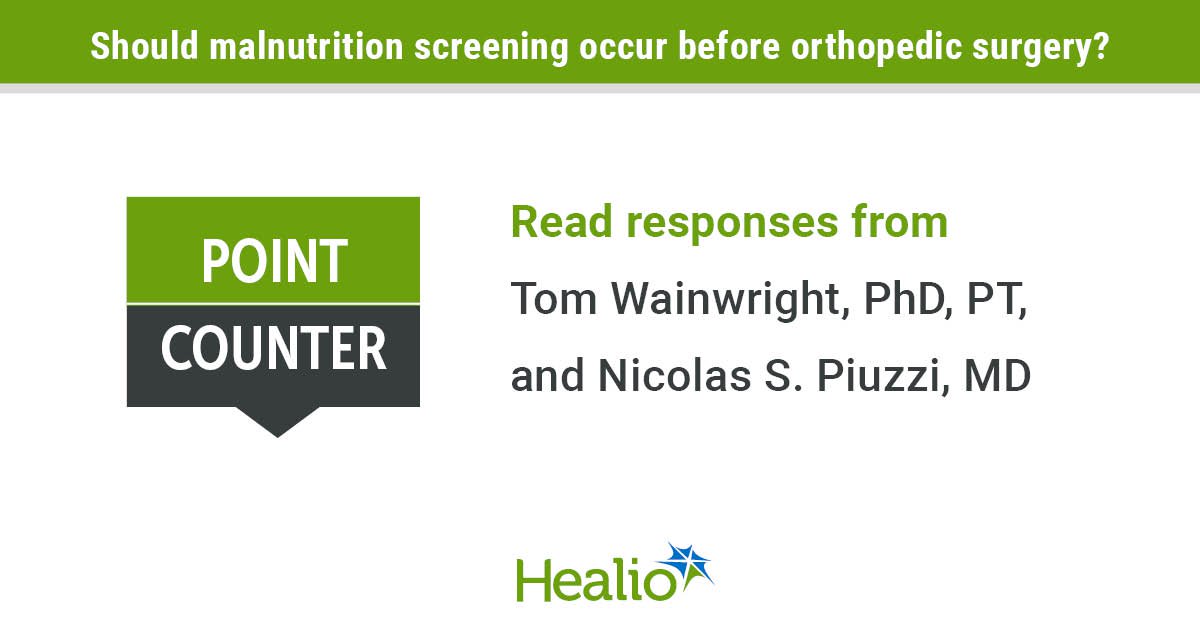August 08, 2025
3 min read
Click here to read the Cover Story, “Nutrition may be key to muscle, bone health after surgery.”
Do not ignore nutrition
Despite significant advancements in surgical technique, anesthesia and rehabilitation, nutritional status — an important contributor to outcomes after orthopedic surgery — has been routinely overlooked until more recently.

Malnutrition, particularly in the form of sarcopenia and undernutrition, often remains underdiagnosed and undertreated, yet we are increasingly finding it may have a measurable and modifiable impact on recovery.
Across a series of recent publications, my colleague, Matteo Briguglio, RDN, PhD, and I have described and demonstrated that nutritional disorders are more prevalent in patients undergoing joint arthroplasty and spine surgery than might initially be thought. In our most recent prospective cohort of older adults undergoing total hip arthroplasty, 43% had a nutritional disorder at admission, such as sarcopenia, undernutrition and combinations thereof. In this cohort, nutritional disorders with reduced body function and reserves (sarcopenia and undernutrition) grounded a greater vulnerability to surgery in terms of early stress response and short-term recovery. Interestingly, the study also found that none of the patients consistently covered their reference energy and protein needs through diet in the 10 days immediately post-surgery.

Tom Wainwright
These findings align with a broader body of previous surgical evidence, where malnutrition has been linked to increased length of stay, higher complication rates, poorer physical function and higher health care costs. Yet, current preoperative assessment often relies on outdated or incomplete indicators, such as BMI or serum albumin, which may fail to detect more subtle, yet clinically relevant, forms of malnutrition. We have argued that BMI alone is an inadequate risk stratifier. It cannot distinguish between fat and muscle mass, and rigid cutoffs may inappropriately delay surgery for patients who could otherwise benefit from it. Instead, validated tools, such as the Global Leadership Initiative on Malnutrition criteria alongside functional assessments and dietary screening, offer a more precise and personalized approach to risk identification.
Crucially, nutritional disorders are mostly modifiable. Prehabilitation strategies, including protein and energy supplementation, resistance training and tailored dietary education, are low-cost and feasible interventions that can enhance physiological resilience and improve postoperative recovery. Our group has published frameworks that support the practical implementation of nutritional care pathways within orthopedic Enhanced Recovery After Surgery programs.
It is time to move beyond the outdated notion that nutrition is an ancillary concern. Nutritional screening should be a standard component of preoperative care, and personalized interventions offered to those patients “at-risk” of suboptimal outcomes. As we continue to optimize surgical pathways and seek to accelerate the functional recovery of patients, ignoring a patient’s nutritional readiness for recovery is increasingly not an option.
References:
For more information:
Tom Wainwright, PhD, PT, is professor of orthopedics at Bournemouth University and consultant physiotherapist at University Hospitals Dorset NHS Foundation Trust in the United Kingdom. He can be contacted at twainwright@bournemouth.ac.uk.
Nutritional screening is critical
Just as no athlete would approach a marathon without careful attention to nutrition, patients should not enter orthopedic surgery without similar preparation for the metabolic demands of recovery.
Malnutrition is a silent yet significant risk factor that can negatively impact outcomes after orthopedic surgery, such as total joint arthroplasty. Preoperative malnutrition affects an estimated 8.5% to 50% of patients undergoing elective TJA and is strongly associated with increased risks for infection, readmission, delayed healing and mortality. Despite advances in perioperative care, national data demonstrate a persistent burden of nutritional deficits in this population.

Nicolas S. Piuzzi
A growing body of evidence supports the use of objective laboratory markers — such as serum albumin, prealbumin, transferrin and total lymphocyte count — alongside clinical and anthropometric assessments to identify at-risk patients. However, due to the lack of a universally accepted screening tool, a structured, multidisciplinary approach is essential. Effective screening and intervention require collaboration among orthopedic surgeons, primary care physicians, registered dietitians and perioperative care teams.
Importantly, nutritional screening is not simply about identifying risk — it enables actionable, evidence-based interventions. Strategies, such as high-protein and anti-inflammatory dietary regimens, have demonstrated benefits in postoperative recovery, even among patients not previously classified as malnourished. To maximize their effectiveness, these interventions should ideally begin at least 4 weeks prior to surgery, highlighting the need for timely identification and education.
Rather than viewing the waiting period before elective surgery as a delay, clinicians should reframe it as a valuable window for patient optimization. This time can be strategically used to educate and guide patients on nutritional improvements, strengthen interdisciplinary care coordination and improve overall readiness for surgery.
Ultimately, nutrition is one of the most modifiable and impactful levers we have to enhance surgical outcomes. Integrating routine nutritional screening and intervention into preoperative orthopedic care is not optional. It is a clinically meaningful action that supports safer surgery, faster recovery and more durable value-based care.
References:
Nicolas S. Piuzzi, MD, is vice chair of research in the department of orthopedic surgery and director of Cleveland Clinic Adult Reconstruction Research at Cleveland Clinic in Cleveland. He can be contacted through Grant Passel at passelg@ccf.org.










